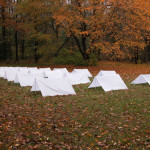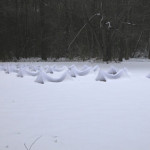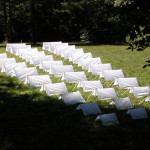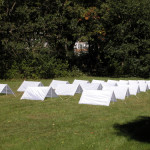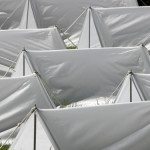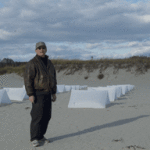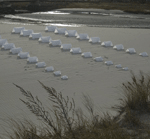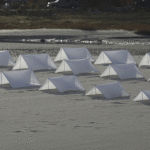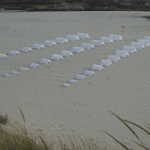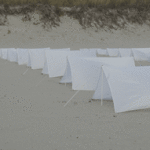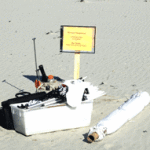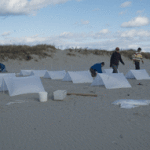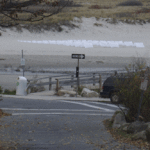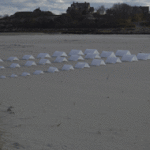July, 2003, Art Complex Museum, Duxbury, MA. And outdoor installation part of a group show that asked the Boston Sculptors to make work based on the permanent collection of the museum. All of the pieces fell in place for this installation when I read President Abraham Lincoln’s 1864 letter, included in the collection of the Art Complex Museum, to Michael Kahn, the newly elected governor of Louisiana cautiously suggesting that the governor might consider allowing the state’s Negro civil war veterans the voting right. As a student of military history, I had seen the photographs of the ordered rows upon rows of white general purpose tents at Andersonville and Appomattox – the Lincoln letter triggered that memory and it melded with other images from my own days and nights at bivouac and further to the recent TV shots of the tent cities in Kuwait. There were many stops in between. Tents began to take on a more symbolic meaning: not only did they serve as a home away from home for the individual soldier, but collectively, in the form of a bivouac, they represented a military presence. It is a presence with no implication of threat, no heroics and absolutely no glory, just the quotidian utility of temporary shelter from the elements. Since the military is known as the second oldest profession, the bivouac, in one form or another, has been a part of the social fabric of humankind and will likely remain so as far as the eye and mind can see.
On Veterans Day 2008 I decided to honor the occasion with a temporary installation.
I selected a site on Good Harbor Beach, near where I live and, with a little help from my friends, Tom and Joy Halstead, Norma Tarr, and Karen Ristuben and her son Jake, we commenced the installation at the eleventh hour on 11/11/2008. It was a cold, blustery day and the installation of tents in high wind was a challenge, but we persisted and completed the task just after noon. After my helpful and generous friends departed, I stayed with the installation for the remainder of the day and chatted with the curious visitors who wandered to the South end of the beach. The most frequently asked question was, “what does ‘bivouac’ mean?”, and it served as just another reminder of how far removed the civilian citizens are from the military experience.
At the end of evening nautical twilight, I struck the show and packed it up in the van, leaving behind only the traces left in the sand by the wind blowing through the tents and our footprints – all to be erased by the next high tide.
This installation was supported by a generous donation of time and materials from the Heritage Flag Company of South Boston, MA. www.HeritageFlag.com.
